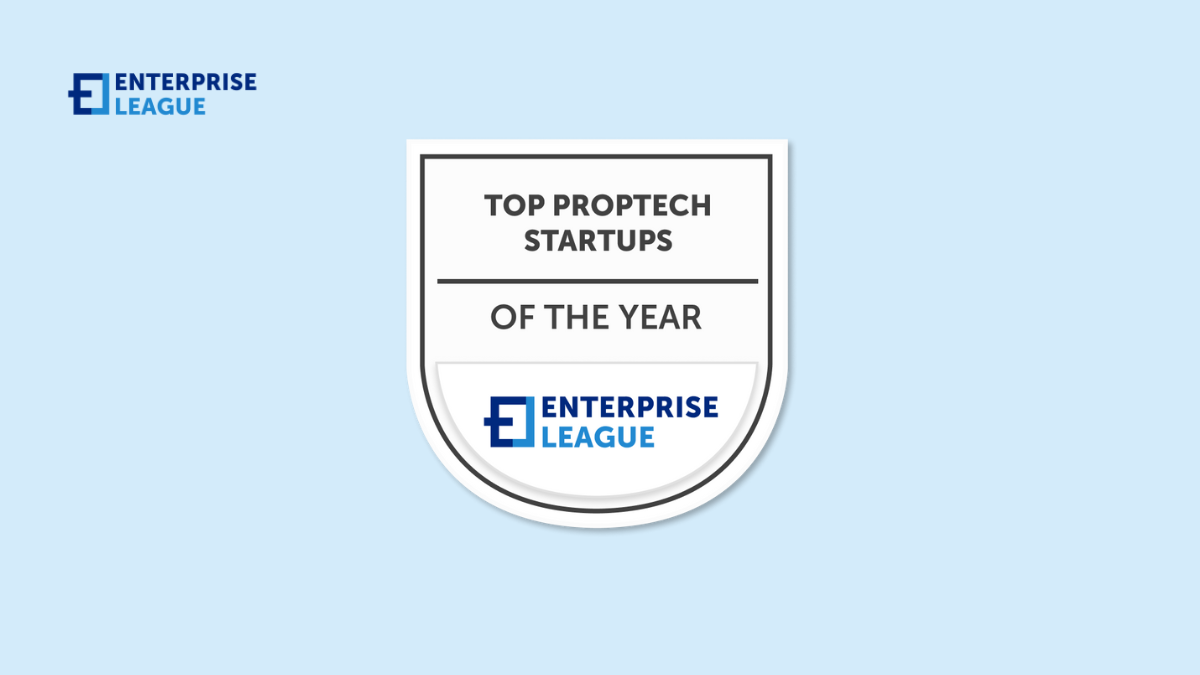16 innovative proptech startups turning property headaches into digital bliss
May 07, 2025

Proptech startups are becoming the new architects of how we interact with buildings and spaces and by this we mean the traditionally slow-moving real estate industry. Unlike conventional real estate startups that often rely on paperwork and in-person interactions, proptech companies create frictionless experiences through mobile apps, AI tools, and smart building technology. The market for these solutions continues to grow rapidly and is expected to reach an astonishing $88.37 billion by 2032 since property owners, managers, and buyers recognize the efficiency gains and cost savings that come with digitization.
What are proptech startups?
Proptech startups are simply companies that use technology to solve problems in the real estate industry. These businesses create digital tools and platforms that make buying, selling, renting, managing, or developing property easier and more efficient.
Proptech (short for “property technology”) includes a wide range of applications, from online property buying platforms and management software to smart home systems and even drones for property surveys. The goal is to make real estate transactions and management more user-friendly and less complicated than traditional methods.
Top proptech startups
Complete list of the most proptech startups that are worth knowing:
Kin Insurance
Founded in 2016, Kin Insurance was created to address the challenges homeowners face in disaster-prone areas where traditional insurance companies often charge extremely high rates or refuse coverage altogether. Their direct-to-consumer model eliminates agents and unnecessary overhead, allowing them to offer more affordable policies in states like Florida, Louisiana, and California where climate risks are increasing.
The Kin platform uses satellite imagery, property records, and advanced data analytics to assess home risks more accurately than traditional insurers. Rather than relying on broad ZIP code ratings, they evaluate each property individually based on its specific characteristics and vulnerabilities. Their online application process takes minutes instead of days, with quotes generated almost instantly based on their proprietary risk algorithms.
HomeViews
Founded in London in 2018, HomeViews was created to bring transparency to the residential property market. Unlike traditional real estate listings that only show promotional content, HomeViews collects and verifies authentic resident experiences. Their platform enables current and former tenants to share detailed feedback about living in specific buildings and developments across major cities.
The HomeViews system organizes reviews around key aspects of residential life, from building management and maintenance to amenities and neighborhood atmosphere. Each verified review includes ratings across multiple categories and written commentary that helps prospective renters understand the day-to-day reality of living in a particular property. Property managers and developers also engage with the platform, responding to feedback and highlighting improvements.
Hostify
Founded in 2018, Hostify was created to simplify the growing complexity of managing vacation rentals across multiple booking platforms like Airbnb, VRBO, and Booking.com. Their all-in-one system synchronizes calendars and pricing to prevent double bookings while maintaining consistent rates across all listing sites. The platform automatically updates availability when a reservation comes in from any channel.
Hostify streamlines guest communication with automated messaging for booking confirmations, check-in instructions, and follow-up surveys. Their unified inbox keeps all guest conversations organized regardless of which platform the booking originated from. The system also manages operational tasks like cleaning schedules, maintenance requests, and key handovers to ensure properties are always guest-ready.
VergeSense
Founded in 2017, VergeSense uses small, ceiling-mounted sensors with computer vision technology to anonymously count people and analyze how they use office spaces. Their platform collects real-time occupancy data showing which meeting rooms, desks, and common areas are being used throughout the day and week. This information helps companies understand workplace utilization patterns without invading employee privacy.
The VergeSense dashboard translates raw occupancy data into actionable insights about space efficiency. Companies can identify underutilized areas, conference rooms that are frequently booked but sit empty, and spaces that consistently reach capacity. These insights help facilities teams make informed decisions about office layouts, desk-sharing ratios, and real estate needs. Since the pandemic, VergeSense has added features to monitor social distancing and occupancy limits.
Hostaway
Founded in 2015, Hostaway was created to solve the growing complexity of managing listings across multiple booking platforms. Their all-in-one system centralizes reservations, communications, and operations in a single dashboard. Property managers can update pricing, availability, and listing details once, and Hostaway automatically syncs these changes across all connected channels to prevent double bookings.
The platform includes automated messaging tools that handle guest communication from booking confirmation to check-out instructions. Their mobile app allows property managers to respond to inquiries quickly while on the go. Hostaway also offers a robust API that integrates with other hospitality tools like keyless entry systems, cleaning services, and dynamic pricing algorithms.
EliseAI
Founded in 2017, EliseAI was created to solve the persistent problem of slow response times in residential leasing. Their platform uses conversational AI to engage with potential renters 24/7 through text messages, phone calls, and web chat. This ensures that property management companies never miss rental inquiries, even outside of office hours when many prospective tenants are actively searching.
The EliseAI system can answer detailed questions about available units, amenities, pet policies, and pricing without human intervention. When prospects are ready to tour, the AI assistant handles scheduling, sends reminders, and follows up afterward. For property managers, the platform provides analytics on conversion rates and leasing performance while integrating with popular property management software.
Pacaso
Founded in 2020 by former Zillow executives, Pacaso was created to make second home ownership more accessible and sustainable. Their innovative model allows multiple buyers to share ownership of a single luxury property, with each owner purchasing a minimum one-eighth share. This dramatically reduces the entry price compared to buying a vacation home outright.
Pacaso handles all the complicated aspects of co-ownership that typically deter people from sharing vacation properties. They form a professionally managed LLC for each home, handle maintenance and bill payments, and provide a scheduling app that ensures fair usage throughout the year. Unlike traditional timeshares, Pacaso owners build equity in a real estate asset they can later sell at market value.
Amenitiz
Founded in 2018, Amenitiz was created to solve the technology challenges faced by small and independent accommodation providers. Their platform consolidates multiple hospitality tools into one integrated system, eliminating the need for properties to juggle several different software subscriptions. The company’s mission is to give independent hotels the same technological advantages that large hotel chains enjoy.
The Amenitiz system centers around a property management calendar that tracks bookings from multiple sources including the property’s own website, online travel agencies like Booking.com, and phone reservations. Their website builder allows properties to create professional-looking sites with integrated booking engines in just hours, without needing technical skills. Additional features include automated guest communications, dynamic pricing tools, and detailed analytics to optimize room rates.
Field Complete
Founded in 2018, Field Complete addresses the unique challenges faced by contractors who spend most of their time at job sites rather than in an office. Their mobile-first approach allows teams to manage work orders, schedule appointments, and process payments directly from smartphones or tablets while in the field. The system includes GPS tracking so office staff can see technician locations and optimize routing between jobs.
What sets Field Complete apart is their industry-specific templates tailored for different trades like electrical work, plumbing, HVAC, and remodeling. These templates include customized forms for estimates, work orders, and inspections that match the workflow of each specialty. Contractors can capture before-and-after photos within the app, have customers sign off on completed work digitally, and generate professional invoices on the spot.
Opendoor
Founded in 2014, Opendoor pioneered the “iBuying” model that gives homeowners a simple alternative to the conventional home selling experience. Their platform allows homeowners to receive a competitive cash offer on their home within 24 hours, avoiding months of showings, repairs, and uncertain timelines. Sellers can choose their own closing date, ranging from as quick as 14 days to several months, providing flexibility that traditional home sales rarely offer.
The Opendoor process eliminates many pain points in real estate transactions. Their technology uses data from thousands of home sales to accurately price homes, while their streamlined approach reduces paperwork and coordination headaches. For buyers, Opendoor offers self-guided home tours through their app, allowing people to visit properties on their own schedule without appointment hassles.
Parkable
Founded in 2016, Parkable started when the founders noticed countless empty parking spaces in cities while drivers circled blocks looking for spots. Their platform connects people who have unused parking spaces with those who need them. For businesses, the software allows companies to manage their parking lots more efficiently by enabling employees to share assigned spots when they’re working remotely or on vacation.
The Parkable app lets drivers find, book, and pay for parking through their smartphones. For property managers, it provides tools to monitor usage, automate billing, and generate reports on parking utilization. The system uses mobile sensors and barrier controls to verify parking sessions and manage access without requiring expensive hardware installations.
Engrain
Founded in 2009 in Denver, Engrain created interactive mapping tools that show property information in a visual way rather than as lists or spreadsheets. Their signature product, SightMap, turns apartment floor plans and site layouts into interactive digital maps that help renters understand the exact location and features of available units. These maps integrate directly with property websites and leasing systems so prospective tenants can see real-time availability.
For property managers, Engrain’s tools provide detailed analytics on which units receive the most interest and why certain apartments remain vacant longer than others. Their TouchTour system offers self-guided digital property tours on large touchscreens in leasing offices or through mobile devices. During the pandemic, they expanded their virtual touring capabilities to help leasing continue despite physical distancing requirements.
Spruce
Founded in 2016, Spruce reimagines the closing process for property sales and refinancing by combining modern technology with title insurance and escrow services. Their digital platform replaces the traditional paper-heavy closing experience with an online system that keeps all parties informed throughout each step. This transparency helps reduce the anxiety and confusion that often accompanies real estate transactions.
The Spruce system automates many time-consuming manual tasks like document preparation, scheduling, and coordinating between parties. Their technology can cut closing times in half compared to industry averages. For mortgage lenders and real estate companies, Spruce provides APIs that integrate directly with their existing systems, creating a seamless experience for their customers.
BrickX
Founded in 2014, BrickX revolutionized property investment by dividing residential properties into 10,000 digital “Bricks” that investors can purchase individually. This fractional ownership model allows people to start investing with as little as $50, removing the massive deposit barriers that keep many Australians from entering the property market. Each Brick represents actual ownership of a portion of a real physical property.
The BrickX platform lets users browse properties in desirable neighborhoods across Australia’s major cities, review historical performance data, and build a diversified property portfolio across multiple locations. Investors earn their share of rental income monthly and can potentially benefit from capital growth over time. The online marketplace allows Brick owners to sell their holdings when they choose, providing liquidity not typically available in traditional real estate investments.
Cecilian Partners
Founded in 2019, Cecilian Partners was created by real estate industry veterans who recognized how outdated and fragmented the new home-buying journey had become. Their technology creates a unified digital experience that connects all three key stakeholders – developers who plan communities, builders who construct homes, and families who purchase them. This coordination eliminates the confusion and frustration typically associated with buying new construction.
The Cecilian platform provides interactive community maps, virtual home tours, and real-time lot availability that buyers can explore before visiting sales centers. For developers and builders, it centralizes project information, customer communications, and purchase milestones in one system. This visibility helps prevent the miscommunications that often cause delays and disappointment in the new home process.
Open House Wizard
Founded in 2018, Open House Wizard was created by former real estate agents who recognized that open houses were missing a crucial technology upgrade. Their tablet-based registration system captures visitor information digitally while they attend property showings. This eliminates illegible handwriting issues and creates instant digital records that integrate with customer relationship management systems.
The Open House Wizard platform goes beyond basic data collection by automatically sending personalized follow-up messages to visitors after they leave. It captures detailed feedback about each property and tracks which visitors are actively working with other agents. For mortgage professionals at open houses, the system can qualify potential buyers on the spot and schedule loan consultations.
Conclusion
We all know how frustrating property experiences can be, the paperwork, the waiting, the confusion… people are hungry for better ways to do things. These companies show how technology can get a grip on challenges across every segment of real estate, from revolutionizing commission structures to creating subscription-based property management solutions. They’re proving that with the right combination of innovation and market understanding, it’s possible to bring meaningful change to one of our oldest and most essential industries, replacing outdated real estate business models with streamlined digital alternatives that better serve today’s property buyers, sellers, renters, and investors.
Discover more creative startups that might interest you:
- The best cyber security that are working on keeping the Internet a safe space.
- Must-know hvac manufacturing startups that redefine the industry norms.
- Innovative mental health startups with tremendous potential in near future.
- Successful travel startups innovating better trip experiences for digital-savvy travelers.
- Top sales startups with powerful solutions for revenue growth.
Related Articles
10 business tips for beginners to help you build a healthy brand
Starting a business can be quite the challenge especially if you’re all new to entrepreneurship. These business tips for beginners will help you set off on the right foot.
SEO writing: Five foolproof tips to secure you the first page
When it comes to SEO writing it’s more guessing and less evidence about what works and what doesn’t. Luckily, we know what can really help you reach the first page.
How to onboard a new employee: Tips for quick integration
Your guide to smoother employee onboarding where you will find practical strategies that help new hires feel welcome and become productive team members faster.
10 business tips for beginners to help you build a healthy brand
Starting a business can be quite the challenge especially if you’re all new to entrepreneurship. These business tips for beginners will help you set off on the right foot.
SEO writing: Five foolproof tips to secure you the first page
When it comes to SEO writing it’s more guessing and less evidence about what works and what doesn’t. Luckily, we know what can really help you reach the first page.







